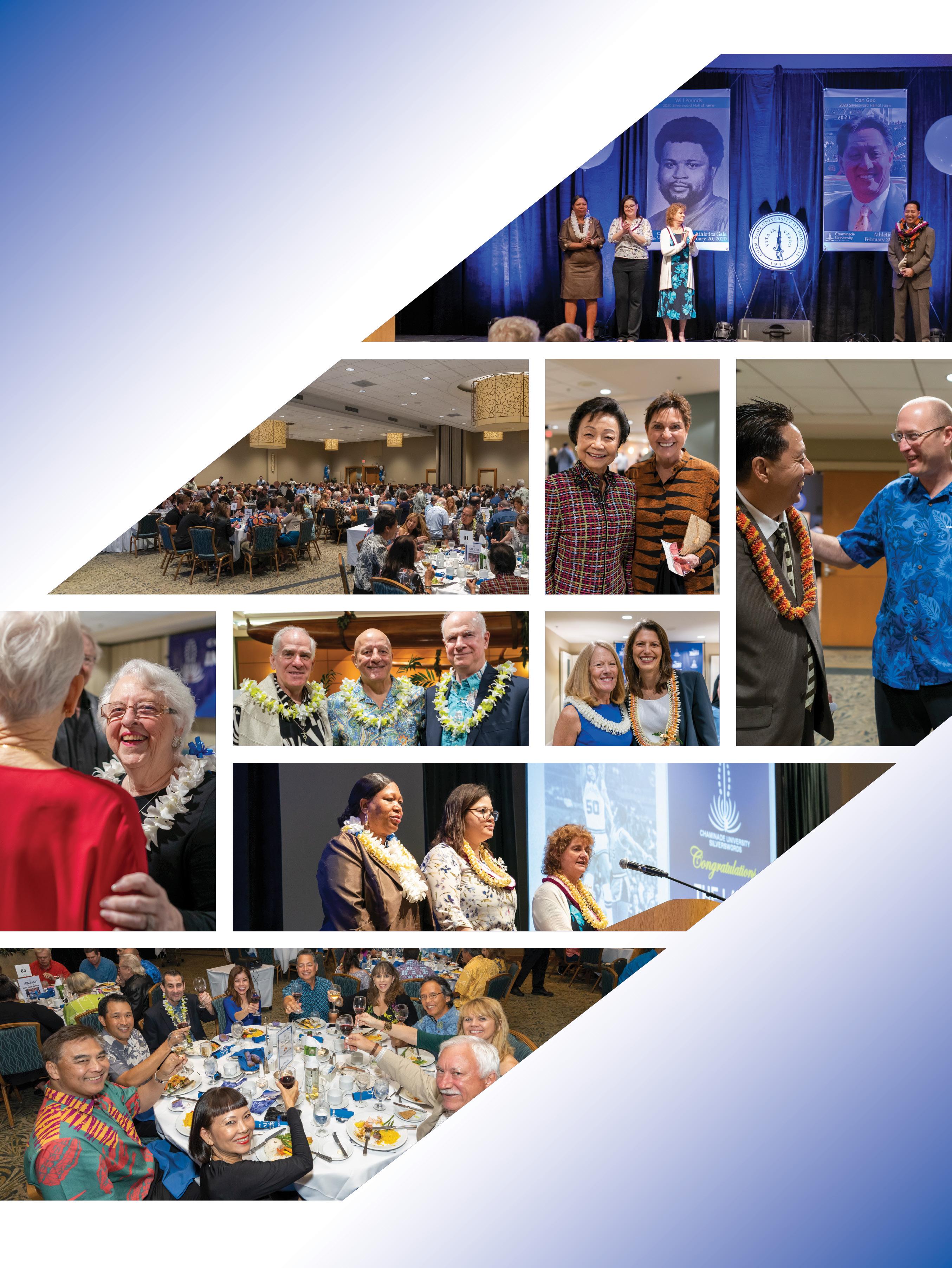
7 minute read
Leaving a Legacy to Chaminade University
AN INTERVIEW WITH DR. CATHERINE BURTON
DR. CATHERINE BURTON HAS BEEN PART OF THE CHAMINADE UNIVERSITY 'OHANA FOR OVER TWENTY YEARS AS AN ADJUNCT FACULTY MEMBER, STUDENT MENTOR AND ACTIVE PARTICIPANT OF THE CHAMINADE COMMUNITY. HER COMMITMENT TO BUILDING A POSITIVE FUTURE HAS LED HER TO MANY REMARKABLE EXPERIENCES AND RECENTLY CULMINATED IN HER BECOMING THE NEWEST MEMBER OF CHAMINADE’S LEGACY SOCIETY.
Advertisement
Chaminade Magazine sat down with Dr. Burton to learn more about her background, teaching and experiences, and about her heartfelt decision to leave a legacy to Chaminade.
Dr. Burton, please tell me about your professional background, and about your education as a clinical psychologist.
I am a clinical psychologist with a three-year post-doctoral training in systems theories and family therapy. As I began my career in the early 1980s, my great interest was in the burgeoning field of whole systems thinking. My interest was guided by the idea that everything is interconnected as part of a greater whole. This led me on a decadelong journey to discover how this thinking applied to individuals, families, communities, organizations, societies and to the planet as a whole. On this journey, I gained an understanding of the relationships between the new physics, psychology and the world’s great spiritual and religious philosophies, which seemed to provide a new way of thinking about the emerging issues facing humanity and the planet as a whole. It was a time of great enlightenment when many leadingedge thinkers were finding a language that could give voice to this new paradigm and its application to the field of psychology.
Can you say more about what you discovered on your search?
If I may, I would like to answer this by mentioning some of the new paradigm solutions I participated in with the hope that they might serve as a springboard for others in their own search for answers. How does your background on the new paradigm relate to some of the experiences we are facing now?
In the early 1980s, I encountered many leading edge ideas through my professional career. I taught at Antioch University in Seattle; I trained with Bill Mollison, the founder of permaculture, at the Chinook Learning Community (now the Whidbey Institute) and I studied cooperative economic systems at The Schumacher Institute.
Out of these experiences, I began researching and editing an EarthBank economic newsletter which became the EarthBank Guide to Sustainable Economics and included one of the earliest directories for socially responsible investing. As a result, I was asked to become part of a group to convene the first North American Bioregional Congress (NABC) with the goal of launching a non-political Green Movement. I was trained by a Native American elder and Quaker in consensus decision making to help facilitate the 200 attendees in coming to consensus on the principles and values of this movement.
As my thinking expanded to finding solutions for planetary governance, my interest began to shift toward peace-making, and this led to my participating in a search for common ground intensive between those who wanted peace through armament and those who wanted peace through disarmament. The common ground that came out of that dialogue was the need for security and communication. This took place just before the birth of the telecommunications revolution. This intensive was part of the training I received to become part of one of the first citizen diplomacy trips to the Soviet Union in the mid-1980s. This trip became an extraordinary experience of recognizing our common humanity. Like many others at that time, I was becoming a global citizen learning to think globally and act locally, and experiencing and helping to birth a new world that was coming into existence.
When did you start teaching at Chaminade?
After living in Seattle and in the Bay Area, I moved back to Hawai'i. It was in the early ‘90s when I became part of the adjunct faculty at Chaminade focused on teaching graduate psychology courses in the Master of Science in Counseling Psychology program.
Why did teaching at Chaminade interest you?
From the very start, I could feel a sense of graciousness and community at Chaminade. I loved teaching at Chaminade, the smaller classes, the students who were—and are—so interested in what they were learning. I realized that this sense of community came from deeply felt values that informed both the educational programs and the Chaminade community itself.
Tell me about your experience with the Chaminade values.
The values have been palpable in my experience at Chaminade. The five values include educating for formation in faith as the complement to reason and intellectual rigor; providing an excellent education of the whole person that also embraces cultural diversity; education that fosters the development of community that is felt as a “family spirit”; education that serves the common good with its applications to peace and justice in the larger world; and education for adaptation and change that acknowledges Father Chaminade’s wisdom that “new times call for new methods.”
These values really do encapsulate the Chaminade experience.
Yes, they really do. The five values of Chaminade inform the way we teach. They are, in a very real way, an expression of the “new paradigm” that I have always wanted to experience and that led to my own transformation over the last few decades. To actually be a part of a fully developed spiritual and educational community with students so eager to learn, with a sense of the family spirit in the psychology department, with the welcoming Marianist Brothers and their programs, all contributed to enriching my life and deepening my own development. Yet an even greater transformation occurred as a result of my connection to Chaminade.
It started with my attending a lecture in 2015 at the Mystical Rose Chapel on a Montessori-based Sunday school program called the Catechesis of the Good Shepherd. Attending the lecture inspired me to take the 90 hours of training in order to learn and experience this Montessori method. This experience further led to my attending Catholic Church and Mass and, along with my deeply meaningful experiences in the Chaminade community, led to my becoming Catholic. I was becoming whole, as the word Catholic signifies, and my life was becoming more sacred, more connected to the Divine, to the Christ, and to my desire to be of service to God.
Yet, it was when I began reading and studying the Catholic social teachings that I found answers to society’s problems that made sense to me at a larger level. In attending Catholic church, I was seeing intact, healthier families. Having searched for answers to family problems as a psychologist for 40 years, it was like coming into the promised land. Through studying the history of the Catholic Church, the lives of the Saints and the progress of civilization divinely inspired by those following a Catholic path, I realized that here were answers I wanted to support, and here was a direction that made sense to me and that could provide answers for society in the future.
How did you decide to become a member of the Legacy Society and participate in the Planned Giving program at Chaminade?
When I first started thinking about planned giving, I was given some good advice, which guided me to answer the question, “who do you want to thank?”
That led me to ask a second question: “whose work and vision do you feel in alignment with and want to support? As a psychologist, my own journey to find solutions to the problems of individuals and society has included becoming familiar with the primary teachings, philosophies and practices of the world’s major religions.
The life lesson I learned from this search was that without some kind of moral or ethical or spiritual or higher philosophy, the mind can gradually become more and more outer driven in a way that affects human behavior and which, in turn, can create systemic problems. Yet when reconnected to our whole selves and its deeper wisdom and compassion, we can find solutions to problems and live in greater health and wholeness.
To me, Chaminade represents this kind of solution that is grounded in both the higher moral values of the Marianist community and that offers an education of the whole person. The evidence-based, best-practice graduate programs at Chaminade serve real human needs and are helping to create a positive future for individuals, families and society.
Giving to Chaminade became a major way I could help build a better world. This was how I came to my decision to include Chaminade University in my estate plans and to leave a planned gift to Chaminade.
I want to offer my deep and heartfelt thanks to Chaminade University’s divinely inspired community and for the many ways it has enriched my life and the lives of all those it touches. We are so fortunate to have you here in Hawai'i. Thank you for being such a wonderful demonstration of what you teach and for providing such a remarkable pathway into a positive future.

TO OUR GENEROUS DONORS WHO SUPPORTED OUR STUDENT-ATHLETES AND 10 ATHLETIC PROGRAMS DURING OUR 12TH ANNUAL INTERCOLLEGIATE ATHLETICS GALA ON FEBRUARY 20, 2020.
WATCH THE ATHLETICS GALA CELEBRATION: YOUTUBE.COM/CHAMINADEUNIVERSITY










